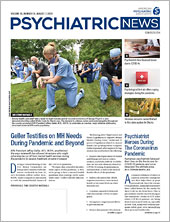A testosterone-suppressing drug may rapidly reduce pedophilic thoughts in men diagnosed with pedophilic disorder, reports a study published in JAMA Psychiatry. Though the study observed only the effects of the medication for a two-week period, experts said the findings represent a critical advancement in treating pedophilic disorders.
Pedophilic disorder is characterized by recurrent sexual attraction to prepubescent children, according to DSM-5. Some testosterone-suppressing medications are currently provided as a pedophilia treatment (an intervention known as chemical castration) but are mostly limited to forensic settings like prisons. A major reason is that these drugs—known as gonadotropin-releasing hormone agonists—induce a short-term surge in testosterone production before suppressing it over a course of weeks or even months. During that surge period, the individual has an increased risk of acting on sexual impulses and therefore providing such drugs to people outside of an enforced setting is dangerous.
In this study, researchers at Sweden’s Karolinska Institutet and University of Gothenburg tested a gonadotropin-releasing hormone antagonist called degarelix, which blocks gonadotropin-releasing hormone receptors from receiving signals and suppresses testosterone quickly without an initial surge. (This medication is approved by the Food and Drug Administration for the treatment of prostate cancer.)
The researchers recruited 52 men aged 18 to 66 years with pedophilic disorder who had reached out to a national helpline for unwanted sexual thoughts. All the participants were considered to be at low-to-moderate risk of sexual abuse based on their responses to assessments of their sexual preoccupation, self-regulation, cognitive empathy, and antisocial traits. The participants were randomly given an injection of degarelix or placebo each week for two weeks.
After two weeks, the participants taking degarelix reported significantly fewer pedophilic thoughts and overall sexual thoughts than those given placebo. There were no statistically significant differences between the two groups in self-regulation and empathy scores. The individuals who took degarelix maintained their improvements in unwanted sexual thoughts at a follow-up visit eight weeks later. The participants also provided interviews at the end of the study describing their experiences, and most had a favorable attitude toward the treatment. Side effects were primarily skin reactions at the injection site, but two adults in the degarelix group had to be hospitalized for suicidal ideation.
“Only one participant was lost to follow-up, and 58% of those randomized to receive degarelix wished to continue treatment, which indicates to us a potential role for long-term treatment along with psychosocial support,” wrote lead author Valdemar Landgren, M.D., and colleagues. “In view of the participant wishes and effects expressed in the self-reports, we believe degarelix should be considered for help-seeking individuals with pedophilic disorder.”
Richard Krueger, M.D., the medical director of the Sexual Behavior Clinic at the New York State Psychiatric Institute, cautioned that this study focused on only a few specific risk behaviors over a short, two-week period.
Since scores for empathy and self-control did not differ between participants in the degarelix and placebo groups, Krueger suggested that the observed improvements may have been due to a drop in general sexual function and not a drop in pedophilic desire per se. “Before this drug can have any application, what needs to be done is a study over an extended period of time and/or one invoked in a way that shows this drug will produce effects in practice, such as preventing sexual offenses or re-offenses.” he said.
Krueger noted that any randomized study that would withhold medication from adults with a higher risk of committing sexual abuse is likely to be considered unethical.
“Overall, this is still a milestone moment in the field of sexual disorder research,” Krueger told Psychiatric News. “The researchers completed a scientifically valid randomized study in a field that has virtually none.”
This study was funded by the Gothenburg Society of Medicine, the Swedish Society of Medicine, the Söderström König Foundation, the Fredrik and Ingrid Thuring Foundation, the Karolinska Institutet, and the Research Unit of Skaraborg Hospital. Additional support was provided by other nonpharmaceutical academic sources, as well as by grants under the ALF agreement between the Swedish government and the country councils. ■
Effect of Gonadotropin-Releasing Hormone Antagonist on Risk of Committing Child Sexual Abuse in Men With Pedophilic Disorder: A Randomized Clinical Trial” is posted
here.

